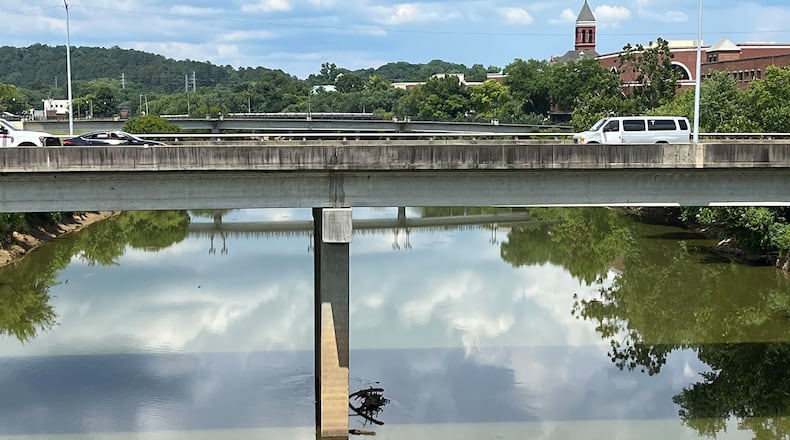DuPont and four other makers of toxic “forever chemicals” agreed to pay the city of Rome $45 million total in damages to settle a lawsuit that accused the companies of fouling the community’s drinking water, records obtained Friday by The Atlanta Journal-Constitution show.
The settlement agreement was released by the city of Rome on Friday after the Georgia Court of Appeals on Tuesday dismissed legal action by the five chemical companies that for six months had kept secret the dollar amount.
E.I. DuPont de Nemours & Co., the Chemours Co., the Chemours Co. FC LLC, DuPont de Nemours Inc. and Corteva Inc. last week asked the Court of Appeals to end their bid to appeal a lower court’s ruling to release the settlement information.
The end of the case is a victory for the public’s access to government records and press freedom in Georgia.
Last September, the companies sued the AJC, Rome News-Tribune and the city of Rome to prevent the news outlets from obtaining information about the damages the companies agreed to pay Rome, alleging that the amounts the companies agreed to pay were trade secrets.
Open government experts assailed the lawsuit saying it was a gross violation of the public’s right to know.
Greg Lisby, a retired Georgia State University communications professor and lawyer who wrote a book on the state’s open records laws, said Friday the chemical companies had no case.
“It was total baloney,” he said.
The original settlement related to the release of chemicals known as per- and polyfluoroalkyl substances, or PFAS, that have contaminated the Rome’s drinking water. Rome, which has been in legal battles with dozens of companies and the city of Dalton’s water utility, had previously released all prior settlements under state law.
The compounds, found in firefighting foam, nonstick and water repellent materials and other goods, have been linked to cancer and other detrimental health and environmental impacts. The companies have denied wrongdoing.
Makers of PFAS chemicals face a mountain of lawsuits and billions of dollars in potential damages nationwide. The companies themselves have a history of announcing their own settlement terms.
In an October court hearing regarding the records lawsuit, an attorney for DuPont said the companies paid Rome a “disproportionately high” settlement compared to their level of responsibility as determined by scientific experts, and making public such information would harm the companies in class-action lawsuits that were pending at that time.
The Georgia Open Records Act, one of the state’s sunshine laws, requires local and state government agencies to release most public documents upon request, and governments typically release settlement agreements as a normal course of business.
The act includes certain exceptions for documents, including some matters that might be deemed trade secrets. But lawyers for the news outlets argued the chemical companies could not produce a court decision from anywhere that supported its argument.
In November, Floyd County Superior Court Judge Bryan Thomas Johnson ruled that the damages paid by the companies were not a “trade secret.”
“The law is actually pretty simple and straightforward,” Lisby said. Trade secrets relate to proprietary business strategies and information about products or other corporate property, he said, that if released would cause significant economic harm.
Damages paid to a government entity to settle allegations of injury or wrongdoing might be embarrassing, Lisby said, but they’re not a trade secret.
“Legal settlements should not be shielded,” he said. “You won’t know if anything is passing for justice if you don’t know what’s going on.”
Though the chemical-makers’ case had dubious legal merit, it did serve to delay public release of the settlement information as other communities considered whether to launch their own lawsuits against the companies.
A lawyer for the five chemical-makers did not immediately respond to a request for comment.
This week, lawyers for the AJC and News-Tribune notified Floyd Superior Court that they intend to seek their legal fees from the chemical makers.
The city sued dozens of chemical companies, flooring makers and the city of Dalton’s utility over the contamination. More than 30 defendants entered into settlement agreements with Rome, including the five companies involved in the lawsuit over open records. These five companies all previously shared common ownership.
Including the settlement with DuPont and the four other companies, Rome will receive roughly $279 million to address the PFAS contamination, based on the settlement terms released to the AJC so far. That includes $75 million from materials manufacturing giant 3M and $25 million from Dalton Utilities.
The settlements will cover the cost of a new, $100 million water treatment plant Rome is building to help remove the toxic substances. City officials initially implemented water rate hikes to pay for the facility, but those were rolled back in June when the settlement was accepted.
In June, three of the companies in this case — Chemours, DuPont and Corteva — announced they would pay $1.19 billion to resolve claims from around the country alleging their PFAS chemicals contaminated hundreds of water systems. That same month, 3M announced it agreed to pay at least $10.5 billion to settle a wave of similar lawsuits. Neither of those figures included the Rome settlements.
Keep Reading
The Latest
Featured



